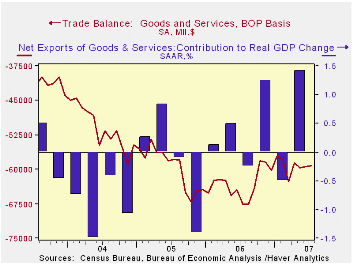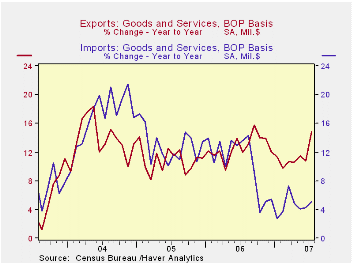 Global| Sep 11 2007
Global| Sep 11 2007U.S. Trade Deficit Continued to Narrow
by:Tom Moeller
|in:Economy in Brief
Summary
The U.S. foreign trade deficit narrowed very slightly in July to $59.2B from a little revised $59.4B in June. The figure was quite near Consensus expectations for a deficit of $59.0B. While only a small improvement, the average [...]

The U.S. foreign trade deficit narrowed very slightly in July to $59.2B from a little revised $59.4B in June. The figure was quite near Consensus expectations for a deficit of $59.0B. While only a small improvement, the average deficit of $59.4 during the last eight months compares to an average of $64.8B during the prior twelve.
Much of the narrowing of the deficit owes to strength in U.S. exports which rose 2.7% (14.8% y/y). Exports of non-auto consumer goods rose 4.2% (13.2% y/y) while exports of capital goods surged 5.3% (13.8% y/y). Advanced technology goods exports slipped 8.6% but the y/y gain of 13.2% suggests some strength. Exports of autos and products rose 14.6% m/m and a blazing 20.9% y/y.
Overall imports rose 1.6% but imports of nonpetroleum products rose 1.6% (4.3%% y/y). The slower gain versus exports is clearly due to the relative performance of the U.S. (weak) and foreign (strong) economies. Imports of nonauto consumer goods increased 1.1% (7.5% y/y) while capital goods imports slipped 0.3% (+5.4% y/y). Imports of advanced technology products fell 1.6% (+12.2% y/y).
The value of petroleum product imports fell 3.4% (-3.8% y/y) but the price of Brent crude oil rose to $75.9.
The U.S. trade deficit in goods with China deepened sharply m/m to $23.8B and versus a deficit of $19.6 the prior July.
| Foreign Trade | July | June | Y/Y | 2006 | 2005 | 2004 |
|---|---|---|---|---|---|---|
| U.S. Trade Deficit | $59.2B | $59.4B | $67.6B (7/06) |
$758.5 | $714.4B | $612.1B |
| Exports - Goods & Services | 2.7% | 1.3% | 14.8% | 12.7% | 10.9% | 13.7% |
| Imports - Goods & Services | 1.8% | 0.8% | 5.1% | 10.4% | 12.9% | 16.8% |
Tom Moeller
AuthorMore in Author Profile »Prior to joining Haver Analytics in 2000, Mr. Moeller worked as the Economist at Chancellor Capital Management from 1985 to 1999. There, he developed comprehensive economic forecasts and interpreted economic data for equity and fixed income portfolio managers. Also at Chancellor, Mr. Moeller worked as an equity analyst and was responsible for researching and rating companies in the economically sensitive automobile and housing industries for investment in Chancellor’s equity portfolio. Prior to joining Chancellor, Mr. Moeller was an Economist at Citibank from 1979 to 1984. He also analyzed pricing behavior in the metals industry for the Council on Wage and Price Stability in Washington, D.C. In 1999, Mr. Moeller received the award for most accurate forecast from the Forecasters' Club of New York. From 1990 to 1992 he was President of the New York Association for Business Economists. Mr. Moeller earned an M.B.A. in Finance from Fordham University, where he graduated in 1987. He holds a Bachelor of Arts in Economics from George Washington University.
More Economy in Brief
 Global| Feb 05 2026
Global| Feb 05 2026Charts of the Week: Balanced Policy, Resilient Data and AI Narratives
by:Andrew Cates






